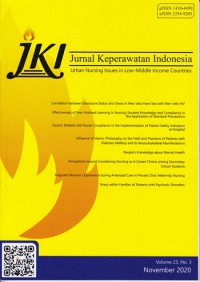
Jurnal
Effectiveness of Peer-Assisted Learning in Nursing Student Knowledge and Compliance in the Application of Standard
The learning process in higher nursing education develops student competences, such as applying standard precautions, in providing professional nursing care. To improve student knowledge and compliance related to standard precautions requires innovation from lecturers in providing appropriate learning methods. Peer-assisted learning (PAL) can enhance the active role of students and improve achievement. The PAL method involves senior students as peer teachers who help junior students. Using a questionnaire as an assessment instrument, this study aimed to determine the effectiveness of PAL on knowledge and compliance in the application of standard precautions in student nurses. This study design was quasi experimental with pre and post assessment and a control group design approach. This research was conducted at the D Hospital in Padang, Indonesia, a hospital where students practice. This study was conducted in June–September 2017 with a sample size of 45. Data analysis using paired t-test showed that the average values of the level of knowledge and skills of students in the application of standard precautions before and after PAL methods differed significantly in the intervention group (p= 0.001). In conclusion, PAL can be applied in the learning process of nursing students to increase student achievement.
Availability
No copy data
Detail Information
- Series Title
-
Jurnal Keperawatan Indonesia, Vol. 23 No. 3, November 2020
- Call Number
-
(05) 610.5 (910) FAK j
- Publisher
- Depok : Fakultas Ilmu Keperawatan UI., 2020
- Collation
-
Hlm. 162-169
- Language
-
English
- ISBN/ISSN
-
1410-4490
- Classification
-
(05) 610.5 (910) FAK j
- Content Type
-
-
- Media Type
-
-
- Carrier Type
-
-
- Edition
-
Vol. 23 No. 3
- Subject(s)
- Specific Detail Info
-
-
- Statement of Responsibility
-
-
Other version/related
No other version available
File Attachment
Comments
You must be logged in to post a comment
 Computer Science, Information & General Works
Computer Science, Information & General Works  Philosophy & Psychology
Philosophy & Psychology  Religion
Religion  Social Sciences
Social Sciences  Language
Language  Pure Science
Pure Science  Applied Sciences
Applied Sciences  Art & Recreation
Art & Recreation  Literature
Literature  History & Geography
History & Geography